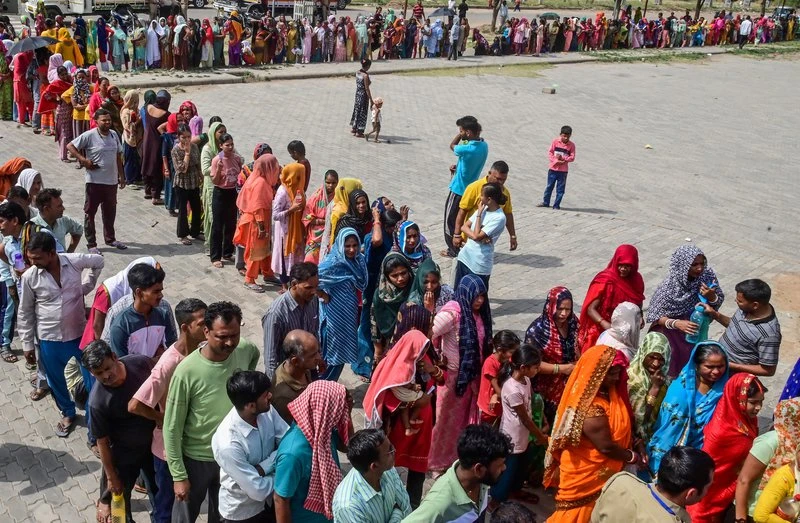India's six-week election ends with vote in Hindu holy city

Stay tuned with 24 News HD Android App

India's marathon election drew to a close Saturday six weeks after voting began, with voters enduring a scorching heatwave to cast their ballots in the Hindu holy city of Varanasi.
Prime Minister Narendra Modi has long been widely expected to win a third term when results are announced Tuesday, in large part due to his cultivated image as an aggressive champion of India's majority faith.
Exit polls -- though historically unreliable at capturing voter shifts in an election with 968 million eligible voters -- are expected to give some initial indication of whether he has succeeded later on Saturday night.
Many in the 73-year-old premier's constituency of Varanasi were eager for that to be the case.
"I voted for growth and development of my country," local resident Brijesh Taksali told AFP outside a polling station.
"There's only one leader that I know... Narendra Modi. I voted for him."
Varanasi is the spiritual capital of the Hindu faith, where devotees from around India come to cremate deceased loved ones by the Ganges river.
It is one of the final cities to vote in India's gruelling election, and where public support for Modi's ever-closer alignment of religion and politics burns brightest.
Modi has already led the ruling Bharatiya Janata Party (BJP) to two landslide victories in 2014 and 2019, forged in large part by his appeal to the Hindu faithful.
'Politics of temples'
This year, Modi presided over the inauguration of a grand temple to the deity Ram, built on the grounds of a centuries-old mosque in Ayodhya razed by Hindu zealots in 1992.
Construction of the temple fulfilled a longstanding demand of Hindu activists and was widely celebrated across the country with back-to-back television coverage and street parties.
The ceremony, and numerous other chest-beating demonstrations of fidelity to India's majority religion over the past decade, have made many among the country's 200 million-plus minority Muslim community increasingly uneasy about their futures.
Modi himself has made a number of strident comments about Muslims on the campaign trail, referring to them as "infiltrators".
He has also accused the motley coalition of more than two dozen opposition parties contesting the poll against him of plotting to redistribute India's wealth to its Muslim citizens.
Janesar Akhtar, a Muslim clothesmaker working in Varanasi's famed embroidery workshops, told AFP that the BJP's sectarian campaigning was an unfortunate distraction from India's chronic unemployment problems.
"Workshops here are closing down and the Modi government has been busy with the politics of temples and mosques," the 44-year-old said.
"He is supposed to give us jobs and not tensions."
'A lot more respect'
Analysts have long expected Modi to triumph against the opposition alliance, which at no point has named an agreed candidate for prime minister.
His prospects have been further bolstered by several criminal probes into his opponents and a tax investigation this year that froze the bank accounts of Congress, India's largest opposition party.
Western democracies have largely sidestepped concerns over rights and democratic freedoms in the hopes of cultivating an ally that can help check the growing assertiveness of China, India's northern neighbour and rival regional power.
Modi's image at home has been bolstered by India's rising diplomatic and economic clout -- the country overtook Britain as the world's fifth-biggest economy in 2022.
"As an Indian, I feel that he has ensured a lot of respect and prestige for India during his term," Shikha Aggarwal, 40, told AFP while waiting to cast her vote.
"People now look at India and Indians with a lot more respect, something not accorded earlier."
'Stay hydrated'
India has voted in seven phases over six weeks to ease the immense logistical burden of staging an election in the world's most populous country.
Turnout is down several percentage points from the last national election in 2019, with analysts blaming widespread expectations of a Modi victory as well as successive heatwaves scorching India's northern states.
Authorities in the eastern state of Bihar said Friday that 10 poll workers had died of heatstroke the previous day while setting up for the vote.
Extensive scientific research shows climate change is causing heatwaves to become longer, more frequent and more intense, with Asia warming faster than the global average.
A scorching sun bore down on Varanasi and its countless temples and riverside crematoriums during Saturday's vote, with afternoon temperatures peaking at 45 degrees Celsius (113 Fahrenheit).
"The last few days have been very tough," housewife Bindwasvini Devi, who voted soon after polls opened to beat the scorching temperatures.
"We've tried to stay hydrated and avoided going out as much as possible."
